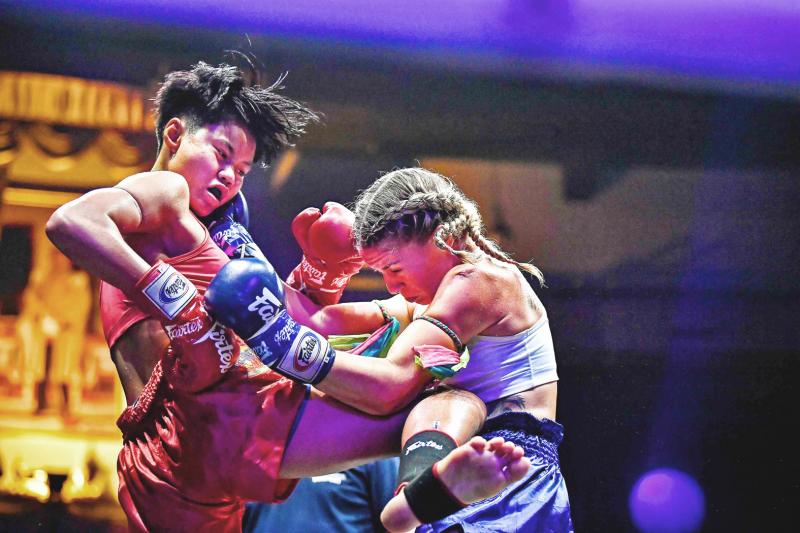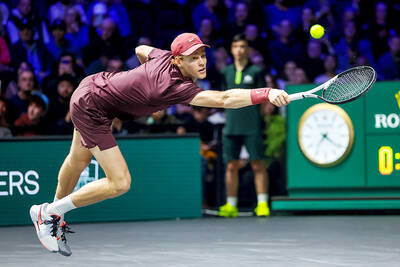Out with the gamblers and harsh neon lights, in with female fighters and fancy lasers — after a 20-month break because of COVID-19, Muay Thai’s spiritual home is embarking on a revolution.
On fight days before the COVID-19 pandemic, thousands of passionate fans would pack Bangkok’s Lumpinee Stadium — the symbolic heart of the ancient art of Muay Thai.
It was not just admiration for the fighters’ skill that drew the crowds: On big days more than US$1million could change hands in bets, in a country where gambling is largely illegal.

Photo: AFP
Then, in March last year, everything came to a halt as Thailand’s first COVID-19 outbreak was traced back to the stadium, which was immediately closed.
Rather than throw in the towel, the stadium owners — the Royal Thai Army — said they have bounced back off the canvas to turn the enforced break into an opportunity.
Major General Ronnawut Ruangsawat, deputy chief of the stadium, said that the grand old arena was “taking advantage of the pandemic to revolutionize itself.”
“The arena has been completely renovated, betting is now prohibited and women are allowed to fight,” he said.
Gone are the harsh neon lights that once bathed the ring in an unforgiving white glare, and fighter Sitthichoke Kaewsanga on Saturday stepped into the ring under a shower of ultra-modern red and silver lasers. Behind him, giant state-of-the-art screens previewed the bout with pictures of the 21-year-old and details of his record.
The stands were empty of fans and much had changed, but the hooks, jabs and knee strikes were the same, as was the backdrop of traditional Thai music played by a live band.
Lumpinee is to welcome fans back in January, albeit with a greatly reduced capacity and strict virus-prevention rules.
Betting is to be off the cards because the army decided it “led to too much cheating, with players sometimes being paid to lose the fight,” Ronnawut said. “We want to clean up the sport, and we hope that other venues in Thailand will follow.”
However, industry professionals are skeptical the army’s good intentions will succeed.
“They will continue to bet online — gambling is part of the Muay Thai DNA,” World Muay Thai Organization secretary-general Jade Sirisompan said.
“Many gamblers, among them many gym owners, make a living from it and can pocket thousands of dollars on a good day,” Sirisompan said. “They are not going to give it up.”
No less revolutionary is the decision to allow female fighters to take part in bouts at Lumpinee’s main arena.
For years, women — including fans — were banned from even touching the ring because of a superstition that their menstruating bodies might break the magic protecting it.
Other venues have accepted female fighters for some time, but Lumpinee — the sport’s equivalent of Lord’s in cricket or soccer’s Wembley Staduim — held out.
After a low-profile bout in a backroom in September, two women competed in the main ring for the first time on Saturday.
After beating Australia’s Celest Muriel Hansen, 21-year-old Thai fighter Kullanat Ornok said: “We are so proud to have been the first women to fight here. We’ve been fighting for more equality for years.”
“We have come such a very long way. This was so much more than just a fight,” 27-year-old Hansen said.
For Kullanat, getting back in the ring to earn money after the long break was just as important.
“I hadn’t fought in almost a year. I used to earn US$100 a match, then nothing for months to support my family,” Kullanat said.
Deprived of bouts because of the pandemic, thousands of professional boxers — men and the much smaller number of women fighters — returned to their villages.
After so long away from the grueling daily training regime the sport demands, many will never make it back to the same level and the government has offered no financial support.
Many fighters had no choice but to take side jobs.
Sitthichoke became a rider for a delivery service.
His five-round victory in Saturday’s bout earned him less than US$1,000. Before the pandemic he could earn triple that.
Perhaps inevitably for a venue seen as a bastion of tradition, the changes have not gone down well with everyone.
“We don’t recognize anything. The Muay Thai temple has become a big showroom,” Sirisompan said after watching a broadcast of the matches. “It has lost its soul.”

US President Donald Trump’s granddaughter, Kai Trump, is poised to make her LPGA Tour debut after receiving a sponsor invitation on Tuesday to the Nov. 13 to 16 tournament at Pelican Golf Club in Florida. “My dream has been to compete with the best in the world on the LPGA Tour,” Kai Trump said in a statement posted on the LPGA’s Web site. “This event will be an incredible experience,” she said. “I look forward [to] meeting and competing against so many of my heroes and mentors in golf as I make my LPGA Tour debut.” The 18-year-old high-school senior,

REACTION: Less than 24 hours after a 18-inning Game 3 loss, the Blue Jays’ win ensured that the best-of-seven series is to head back to Toronto for Game 6 tomorrow Vladimir Guerrero Jr on Tuesday blasted a two-run home run as the Toronto Blue Jays bounced back to defeat the Los Angeles Dodgers 6-2 and tie the MLB World Series at two games apiece. Less than 24 hours after a shattering 18-inning Game 3 loss, the Blue Jays climbed off the canvas to breathe new life into their hopes of a first MLB title in 32 years. Guerrero’s two-run blast off Dodgers starter Shohei Ohtani and a superb pitching performance from ace Shane Bieber laid the foundations for a gutsy victory that silenced Dodger Stadium. “I’m always trying to compete

Jannik Sinner on Thursday eased past Francisco Cerundolo 7-5, 6-1 at the Paris Masters to set up a quarter-final clash with Ben Shelton, while reigning champion Alexander Zverev earned a straight-sets win over Alejandro Davidovich Fokina in the third round. A maiden crown in the French capital would return Sinner to No. 1 in the world rankings after current incumbent Carlos Alcaraz suffered a shock early exit at the hands of Britain’s Cameron Norrie. The Italian four-time Grand Slam champion is yet to drop a set in the tournament as he hones in on what would be a fifth title of the

Jemimah Rodrigues on Thursday hit an unbeaten 127 as India pulled off a record chase of 339 against Australia to set up a Women’s World Cup final against South Africa. Rodrigues and skipper Harmanpreet Kaur, who hit 89, put on 167 runs for the third wicket as India won with nine balls and five wickets to spare at DY Patil Stadium, on the outskirts of Mumbai. The hosts finished on a total of 341-5 in reply to Australia’s impressive 338 and ensured there would be a new name on the 50-over trophy tomorrow. Amanjot Kaur hit the winning boundary to trigger wild celebrations